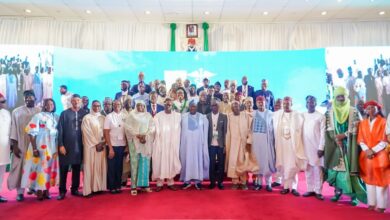How To Cut Down Tobacco Cultivation, Sales, Consumption In Africa

The World Health Organisation (WHO) has disclosed that, to reduce the burden of tobacco and it’s negative consequences, governments have to discourage it’s cultivation, sale and consumption.
WHO Regional Director for Africa, Dr. Matshidiso Moeti stated this in her message commemorating this year’s World No Tobacco Day.
World No Tobacco Day is commemorated on 31 May every year, to raise awareness of the negative health, social, economic and environmental impacts of tobacco production and use.
This year’s theme, “Tobacco: Threat to our environment”, aims to highlight the environmental impact of the entire tobacco cycle, from cultivation, production and distribution, to the toxic waste it generates.
Moeti noted that, despite 24 African countries instituting bans on smoking in public places, and 35 banning tobacco advertising, promotion and sponsorship, a worrisome estimate still showed that 1 in every 10 African adolescents use tobacco.
She also noted that the emergence of new products, such as electronic nicotine and tobacco products, were also proving attractive to youths, compounding the concerns.
Highlighting some of the negative impacts of tobacco cultivation, the WHO Africa Regional Director said:
“The environmental impacts of tobacco farming include massive use of water, which is a scarce resource across most of the continent, along with large-scale deforestation and contamination of our air and water systems.
“Land used to grow tobacco could also be used much more efficiently, especially in countries grappling with food insecurity”.
Also highlighting what WHO was doing in Africa to discourage Tobacco cultivation, she said:
“To help counter the threat, WHO has joined hands with the Food and Agriculture Organization of the United Nations (FAO) and the Kenyan government to create the Tobacco-Free Farms project.
“Launched in March, the project supports farms to switch from tobacco to alternative food crops, that will help feed communities, rather than harm their health. UN agencies and the Kenyan government provide training, inputs such as seeds and fertilizer, and a ready market for their harvest through the World Food Programme’s local procurement initiatives.
“So far, 330 Kenyan farmers have switched to growing beans, with the first harvest yielding more than 200 metric tons. The second season, which has just begun, is now reaching more than another 1000 farmers. This is extremely encouraging for our plans to roll this programme out to other tobacco-growing countries on the continent.
“This is the kind of hard evidence that is essential to change the mindsets of farmers, and governments, who believe that tobacco is a cash crop with the potential to generate economic growth”, she said.
She however lamented that, while tobacco leaf production was decreasing globally, it was increasing in the WHO African Region, which now produces about 12% of all tobacco leaf internationally.
Speaking further on the negative consequences of tobacco, Moeti said:
“Tobacco growing is a significant driver of deforestation too, due to the large quantities of wood needed for curing. Deforestation is, in turn, one of the largest contributors to carbon dioxide emissions and climate change, also advancing loss of biodiversity, land degradation and desertification. Estimates are that the wood requirement to cure tobacco is responsible for 12% of all deforestation in Southern Africa.
“Additionally, tobacco cultivation exposes farmers to several health risks, including “green tobacco sickness”, which is caused by nicotine absorbed through the skin during the handling of wet tobacco leaves, as well as exposure to pesticides and tobacco dust.
“Cigarette butts, meanwhile, are by far the single largest category of litter, with research showing that cellulose acetate-based cigarette filters are largely non-biodegradable. Cigarette butts litter pavements, parks and beaches, finding their way into waterways and leaching harmful chemicals that poison animals and aquatic life – and children”, she said.
The Health Guru therefore called on African governments to impose environmental tax levies on tobacco across the value and supply chains, including production, processing, distribution, sales, consumption and waste management.
Moeti also reiterated WHO’s commitement to fully support and assist farmers in tobacco-growing countries to switch to alternative crops. She therefore, called on African countries to scale up measures to discourage Tobacco consumption in it’s entirety:
“I also encourage our countries to accelerate implementation of the WHO Framework Convention on Tobacco Control (WHO FCTC), which provides the necessary guidance to advance the creation of smoke-free environments, to create programmes to support tobacco users to quit, and support for the application of excise tax and other financial countermeasures.
“Reducing tobacco consumption is a key catalyst towards realizing the health-related Sustainable Development Goals but, as the environmental evidence illustrates, the benefits go far beyond health”, she said.






